Berkeley: The War at Home
With Nicholas Olczak
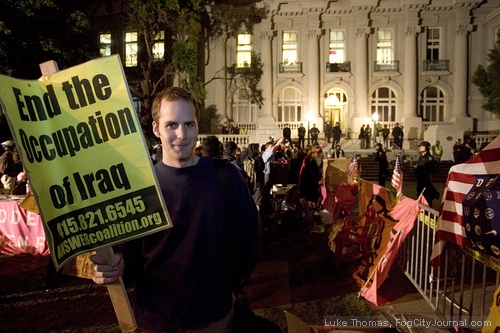
Nicholas Olczak
Photos by Luke
Thomas
By Nicholas
Olczak
February 14, 2008
The musty glow of many lights hangs in the mist around Berkeley
City Hall, the denser beams of spotlights cutting through. Sturdy
riot police are interspersed along the road in front, their thick
arms holding batons across their chests, stern faces staring from
beneath helmets. I step off the curb and one of them growls at
me to get back, followed by the next one along.
We pass a row of clean white television vans parked on the corner,
satellites like strange statues on their roofs. Crossing the road,
the glowing white facade of the hall loom authoritively over us.
But is it just a façade? Today the real authority which
this building holds is being challenged.
A fenced catwalk licks out from the front steps, more muscular
police posed here like grotesque models in a military inspired
show. Their visors are pushed up – hard eyes watching the
crowds around them dispassionately. This gangway physically separates
the two sites of the argument.
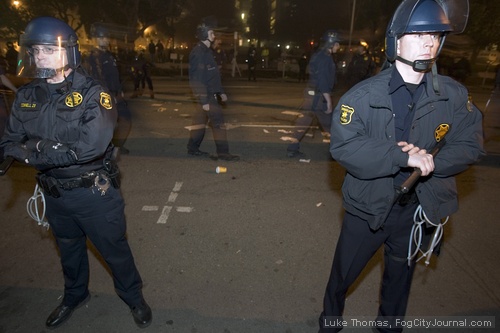
The area on the left is like a small section from a 60’s
music festival. The grass is boggy from restlessly tramping feet,
grubby abandoned placards on the floor. Small tents are pitched,
their domes draped in pink banners about the anti-war group Code
Pink. A mixed crowd stumbles around them – talking, handing
out flyers, dancing and singing.
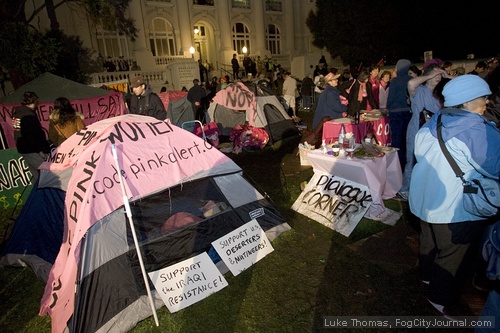
There’s an old man in a bright blue suit, waving a placard
with neat writing saying ‘I can’t afford a real sign.’
A couple of dreadlocked teenagers carry around a stereo and Dylan’s
mellow voice crackles into the busy area. A few kids with skateboards
wander around curiously, one of them picking up a discarded placard
and waving it with excitement.
The right side feels more subdued. Here tidily dressed people,
some with military jackets and hats, press forwards towards the
steps so that there seems a lot less of them than the sprawling
peace activists. Some are waving flags, while others hold Placards
neatly painted in blue, red and white. ‘God Bless America’
and ‘Berkeley Council is a National disgrace’. This
group appears less energetic, less sure what they are supposed
to be doing on a protest like this.
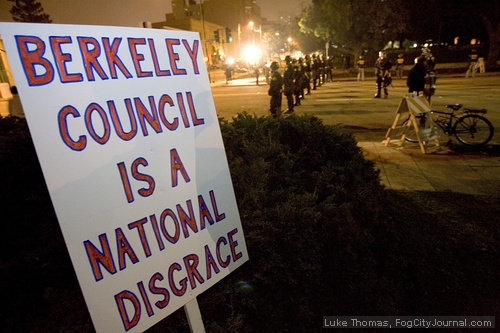
They are all young, even more so than the peace activists. At
this demonstration, and at the Obama rally I attended last week,
I have been struck by how young people have been moved to express
themselves. They are at the centre of these events, the ones who
could grow into Obama’s rule, the ones most likely to go
to Iraq.
A man suddenly surges over, calling out ‘Where’s the
right wing?” He pushed forward into the crowd, shouting loudly
all the time. You’re all fascists he shouts. Most of the
crowd back away, but a sturdy man faces up to him. “Fuck
You!” He shouts, pushing his broad face forward and staring
at the other with hardened, savage eyes. “No, fuck you!”
The smaller man snaps back, stepping forward and rising up a little
more stiffly. They look fiercely at each other and I’m sure
they’re going to fight, waiting for a fist to swing and smack
flesh. But then the smaller man shuffles away, mumbling to himself.
These two are here for the conflict, but it seems like most of
the demonstrators are more serious. They are just people who really
believe in their perspective, enough to trek out on this cold
night to stand up for it. Watching the two sides – I feel
that really it is two different Americas that are set against
each other here.
On one side you have the hippyish peace- protestors, taking the
libertarian but not the consumer part of the American dream, dissatisfied
with the nation, tracing a lineage back to the glory of the 60’s
when America was awash with fellow travelers. On the other you
have working and middle class American, probably living in the
suburbs somewhere, keeping to their neighborly circles, enjoying
moderate comforts that the dream might provide, unconcerned about
freedom.
As the hearing starts almost all the action outside stops and
more placards are thrown down. People turn to face the hall and
listen intently to what is happening inside. This small provincial
conflict has taken on a much greater symbolism. The legitimacy
of the Navy to invade Berkeley acts as a synecdoche for the legitimacy
of America to invade Iraq.
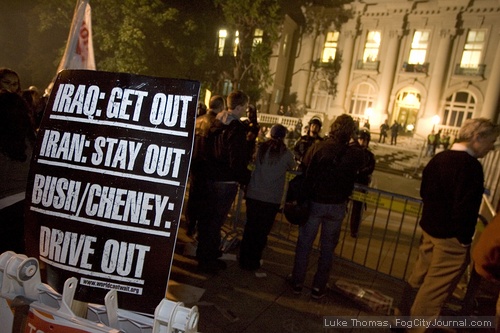
Like that faraway war, our information on the battle inside the
hall is limited, crackling out of speakers so that it’s hard
to get a real sense of the drama inside. A group of older, tattered
protestors retreat into their tent, pulling thick blankets around
them and cradling radios to their ears.
The meeting reaches the public lobbying section. A member of
Code Pink speaks in a slurred, forceful voice. “Our babies,
our eighteen to twenty-six year olds, they're dying out there
– you have to know that!” There are cheers from the
group of demonstrators gathered outside who collectively will
their representative on. “We’ve got to enter the hole
with them.” Another spattering of applause. “You must
have soul!”
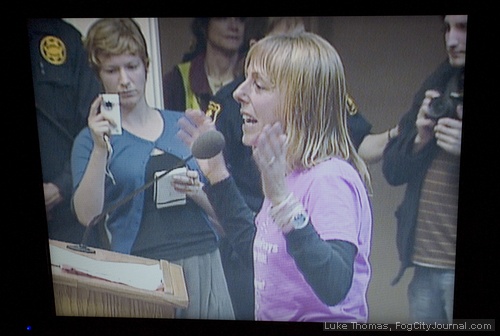
Code Pink co-founder Medea Benjamin
“Yeah, soul!” a man in the crowd whoops, swaying from
side to side, eyes glazed with the excitement of protesting. But
I wonder if something as airy as soul can really be enough to
transcend the earthliness of national politics, the different
machinations and tensions.
Behind us the riot police are changing over. A new squad march
down the channel between the two lines, standing in a regimented
huddle. On a command they step forward and the troops they replace
step back. Feet apart, bodies solid, the new guards settle into
their position – blocks of unfeeling stone that create a
necessary wall between people.
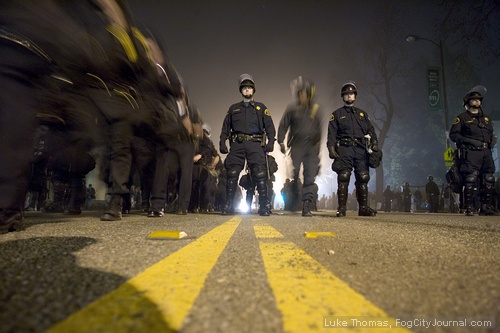
“This is fucking fascism.” A man in the crowd yells.
People turn round to watch as the replaced police march out –
chanting left, right, left right – their long line moving
off along the murky street. I can’t help thinking of images
from Nazi films I’ve seen.
Inside the hall a mother of a soldier comes to the podium, talking
about the picture of her son that she holds. He was shot in Iraq,
but he fought for a noble cause, one that all American’s
should defend. I sense she is struggling to understand how people
can think differently, how people can make her son’s death
seem purposeless. Her voice, deepened by the speakers, is flushed
with emotion. I picture her inside the hall, holding back sad,
proud tears.
“Your son died ‘cause he was stoopid,” shouts
a young African girl bitterly, her braided hair pulled back to
expose a glowing face. Hatred for this pro-war mentality stiffens
her whole body as she listens intently to the speeches. There
is so much passion amongst these peace activists, but much of
it feels misdirected, like a burning blaze from which sparks leap
in all directions.
As we leave, I clamber over a placard sunk into the muddy grass.
Its message – Recruiters Out Of Berkeley – is torn smeared
with dark brown footsteps. Later that evening Berkeley Council
decide
to take back their ‘get out’ letter and the clustered
hopes of the peace activists are broken and walked over too.
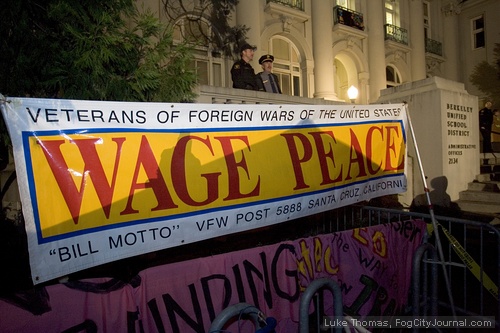
--
Permalink
####
|